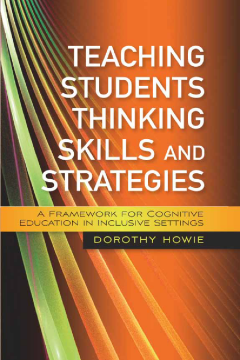
Additional Information
Book Details
Abstract
Developing the ability to think is a major part of education, which helps students become independent learners and participate fully in a learning environment.
This book sets out the theory and outlines a model for implementing the teaching of thinking at whole-school, group and individual levels in inclusive settings. The model uses a three-tier approach to ensure that all learners are included: teaching thinking for all, which takes into account common needs; working with small groups, for those with exceptional needs such as learning difficulties or high ability; and addressing individualised learning needs, including those with a complex disability. The book covers key approaches to the teaching of thinking, giving examples of how each can best be used at each tier level. It also addresses the impact of different social contexts, cultures and environmental surroundings on learning.
This book will be essential reading for all members of school communities, including education leaders and teachers. Educational psychologists, special educational needs co-ordinators, speech and language therapists, and those with particular interest in educating children who are vulnerable, from disadvantaged backgrounds, and from culturally different backgrounds, will find much of value in this book.
Educational Psychologists would benefit from the information that this book provides. Not only in relation to awareness and knowledge of a variety of models of learning through the application of thinking skills (...), but also in terms of the assessment of student experiencing learning difficulties, at whatever level of severity, and the strategies which they can give to teachers as part of their advice to help individual students.
Debate
Dr. Dorothy Howie has been Programme Director for the Postgraduate Diploma in Inclusive Education at the University of Hull, UK. She is an internationally recognised researcher in the teaching of thinking. She is currently Joint Director of the Australasian Institute for Learning Enhancement.
‘Dorothy Howie [has compiled] a theoretically grounded as well as practically relevant book, guiding the reader to implement cognitive education programmes in combination with a practice of inclusive education. There is definitely a need for resources for teachers and teacher trainers to know how to work with a variety of different learners with specific learning needs. This book is a welcomed new source.’
Professor Jo Lebeer, Coordinator, Dynamic Assessment of Functioning for Development towards Inclusive Learning (Daffodil) Project, University of Antwerp, Belgium
